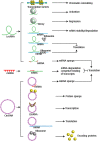Gastric cancer: An epigenetic view
- PMID: 35116105
- PMCID: PMC8790429
- DOI: 10.4251/wjgo.v14.i1.90
Gastric cancer: An epigenetic view
Abstract
Gastric cancer (GC) poses a serious threat worldwide with unfavorable prognosis mainly due to late diagnosis and limited therapies. Therefore, precise molecular classification and search for potential targets are required for diagnosis and treatment, as GC is complicated and heterogeneous in nature. Accumulating evidence indicates that epigenetics plays a vital role in gastric carcinogenesis and progression, including histone modifications, DNA methylation and non-coding RNAs. Epigenetic biomarkers and drugs are currently under intensive evaluations to ensure efficient clinical utility in GC. In this review, key epigenetic alterations and related functions and mechanisms are summarized in GC. We focus on integration of existing epigenetic findings in GC for the bench-to-bedside translation of some pivotal epigenetic alterations into clinical practice and also describe the vacant field waiting for investigation.
Keywords: DNA methylation; Epigenetics; Gastric cancer; Histone modifications; Non-coding RNAs.
©The Author(s) 2022. Published by Baishideng Publishing Group Inc. All rights reserved.
Conflict of interest statement
Conflict-of-interest statement: All authors have no any conflicts of interest.
Figures



Similar articles
-
Epigenetic modifications in gastric cancer: Focus on DNA methylation.Gene. 2020 Jun 5;742:144577. doi: 10.1016/j.gene.2020.144577. Epub 2020 Mar 18. Gene. 2020. PMID: 32171825 Review.
-
Epigenetic signatures in gastric cancer: current knowledge and future perspectives.Expert Rev Mol Diagn. 2022 Dec;22(12):1063-1075. doi: 10.1080/14737159.2022.2159381. Epub 2022 Dec 20. Expert Rev Mol Diagn. 2022. PMID: 36522183 Review.
-
Fluctuations of epigenetic regulations in human gastric Adenocarcinoma: How does it affect?Biomed Pharmacother. 2019 Jan;109:144-156. doi: 10.1016/j.biopha.2018.10.094. Epub 2018 Nov 2. Biomed Pharmacother. 2019. PMID: 30396071 Review.
-
An updated review of gastric cancer in the next-generation sequencing era: insights from bench to bedside and vice versa.World J Gastroenterol. 2014 Apr 14;20(14):3927-37. doi: 10.3748/wjg.v20.i14.3927. World J Gastroenterol. 2014. PMID: 24744582 Free PMC article. Review.
-
Epigenetic Variation Analysis Leads to Biomarker Discovery in Gastric Adenocarcinoma.Front Genet. 2020 Dec 8;11:551787. doi: 10.3389/fgene.2020.551787. eCollection 2020. Front Genet. 2020. PMID: 33363566 Free PMC article.
Cited by
-
Histone and DNA Methylation as Epigenetic Regulators of DNA Damage Repair in Gastric Cancer and Emerging Therapeutic Opportunities.Cancers (Basel). 2023 Oct 13;15(20):4976. doi: 10.3390/cancers15204976. Cancers (Basel). 2023. PMID: 37894343 Free PMC article. Review.
-
Molecular Classifications in Gastric Cancer: A Call for Interdisciplinary Collaboration.Int J Mol Sci. 2024 Feb 24;25(5):2649. doi: 10.3390/ijms25052649. Int J Mol Sci. 2024. PMID: 38473896 Free PMC article. Review.
-
To describe the subsets of malignant epithelial cells in gastric cancer, their developmental trajectories and drug resistance characteristics.Discov Oncol. 2025 Jan 27;16(1):93. doi: 10.1007/s12672-024-01715-5. Discov Oncol. 2025. PMID: 39869282 Free PMC article.
-
Gastric Cancer in the Era of Epigenetics.Int J Mol Sci. 2024 Mar 16;25(6):3381. doi: 10.3390/ijms25063381. Int J Mol Sci. 2024. PMID: 38542354 Free PMC article. Review.
-
Roles of autophagy and long non-coding RNAs in gastric cancer.World J Gastroenterol. 2025 Mar 21;31(11):101124. doi: 10.3748/wjg.v31.i11.101124. World J Gastroenterol. 2025. PMID: 40124267 Free PMC article. Review.
References
-
- Bray F, Ferlay J, Soerjomataram I, Siegel RL, Torre LA, Jemal A. Global cancer statistics 2018: GLOBOCAN estimates of incidence and mortality worldwide for 36 cancers in 185 countries. CA Cancer J Clin. 2018;68:394–424. - PubMed
-
- Theuer CP, Kurosaki T, Ziogas A, Butler J, Anton-Culver H. Asian patients with gastric carcinoma in the United States exhibit unique clinical features and superior overall and cancer specific survival rates. Cancer. 2000;89:1883–1892. - PubMed
-
- Jin H, Pinheiro PS, Callahan KE, Altekruse SF. Examining the gastric cancer survival gap between Asians and whites in the United States. Gastric Cancer. 2017;20:573–582. - PubMed
-
- Cheong JH, Yang HK, Kim H, Kim WH, Kim YW, Kook MC, Park YK, Kim HH, Lee HS, Lee KH, Gu MJ, Kim HY, Lee J, Choi SH, Hong S, Kim JW, Choi YY, Hyung WJ, Jang E, Huh YM, Noh SH. Predictive test for chemotherapy response in resectable gastric cancer: a multi-cohort, retrospective analysis. Lancet Oncol. 2018;19:629–638. - PubMed
Publication types
LinkOut - more resources
Full Text Sources
Miscellaneous

